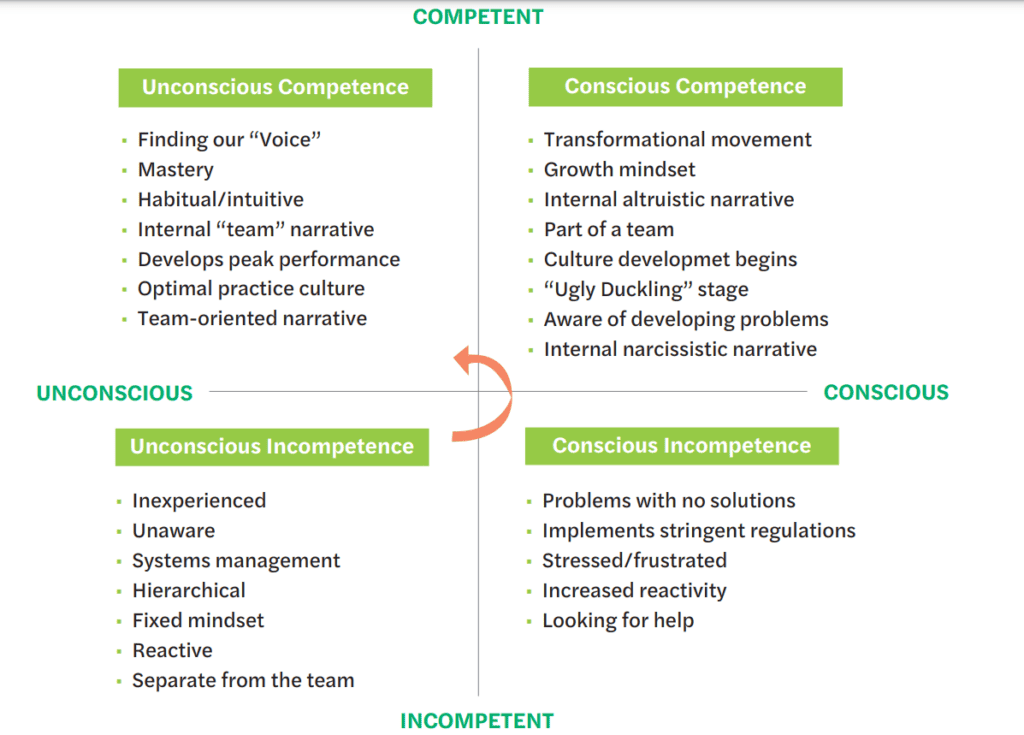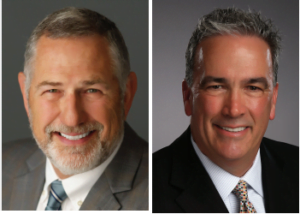Drs. Joel C. Small and Edwin (Mac) McDonald explain how effective leadership of staff entails introspection and self-awareness. Read about finding your voice and creating a team-oriented office.
Drs. Joel C. Small and Edwin McDonald show that leadership takes time and effort
When we observe someone performing at mastery level, they often appear to perform effortlessly, yet their performances belie the effort necessary to achieve mastery. Michael Jordan, for example, was not born as the greatest basketball player of all time. In fact, he was cut from his junior high basketball team due to a lack of skill. The same can be said for great leaders. They were not born as great leaders, but each has endured a journey to competency.
Not long ago, our studies led us to the work of Noel Burch, who in the 1970s developed a theory known as the Hierarchy of Competence. Burch theorized that the journey to mastery of any skill can best be traced through four distinct developmental phases. His theory greatly resonated with us because our personal experience of working with clinical healthcare professionals as executive leadership coaches aligned with his theory.

Unconscious incompetence
Most of us began our careers with the main focus on retiring debt and making a decent living. The best we could do at this point in our career was to create and manage business systems, and with the help of mentors and consultants, to establish systems that enabled us to monitor the vital signs of a clinical dental practice. Our inexperience left us unaware that systems management in the absence of leadership could only take us so far.
Our relationship with our staff was likely hierarchical. We were their boss and felt that the best way to relate to staff was through an arms-length approach. We seldom considered or valued feedback from the staff.
We mistakenly believed that our staff had fixed capabilities with little room for growth. We believed that there would be a limited return on investment for staff development. As time passed, and our practices grew, we became increasingly frustrated by what we perceived to be their inability to develop to meet the increasing demands of a growing practice.
With the increased stress that often accompanies practice growth, we find ourselves reverting to habitual reactive tendencies that are counterproductive to staff development and leadership effectiveness. These destructive reactive tendencies are founded in beliefs and assumptions that we have carried with us from earlier experiences and exist at a subconscious level. Furthermore, until they are brought to a conscious level, we find ourselves incapable of corrective actions.
Conscious incompetence
The transition to conscious incompetence is driven by awareness that problems exist. For many of us, the cause of the problems is not apparent, and therefore creates additional stress and frustration as we feel incapable of finding practical solutions.
We often mistakenly identify external forces such as the economy or increased competition as the cause of our problems. It is not uncommon to blame our staff for our internal practice-related problems. Our internal narrative at this point is often narcissistic and counterproductive as we tell ourselves that “Once I fix them I can be successful.”
We attempted to resolve these problems by creating and implementing stringent and harsh corrective policies intended to resolve staff issues through a command-and-control approach. These actions were the antithesis of effective leadership and often resulted in staff rebellion and/or turnover, which only further amplified the doctor’s stress and frustration.
“With the increased stress that often accompanies practice growth, we find ourselves reverting to habitual reactive tendencies that are counterproductive to staff development and leadership effectiveness. These destructive reactive tendencies are founded in beliefs and assumptions that we have carried with us from earlier experiences and exist at a subconscious level. Furthermore, until they are brought to a conscious level, we find ourselves incapable of corrective actions.”
As the levels of stress and frustration continue to rise, the doctor reverts more often to his or her reactive tendencies which have become their “go to” form of communicating and leading while under stress. This only serves to increase the growing frustration and sense of helplessness to unbearable levels.
It is usually at this point that doctors seek help in the form of coaching. Doctors often seek our help in resolving external causes for their existing problems; never realizing that they are the source of their frustration, and they have always possessed the solutions to resolving their problems. Our job as coaches is to facilitate a process through which doctors become more introspective and self-aware — a process that ultimately brings them to the conclusion that they, and they alone, are the arbiters of their future success.
We help facilitate this awareness process by administering a 360 degree leadership assessment that allows doctors to see their leadership effectiveness through the eyes of those they lead. Many of our clients have described this process as life changing. When doctors are ready to begin their leadership development journey, the magic begins.
Conscious competence
The movement from conscious incompetence to conscious competence is more of a transformational shift than a simple transition. As a doctor enters this phase, they are now aware of their need to change in order to find resolution for their existing practice problems. Their internal narrative has now shifted to become more inclusive and altruistic as they tell themselves that “Once I fix me, WE can be successful.”
Along with this transformational shift, the doctor begins to understand that even though they are the practice owner and leader, they are also part of the practice team. Much of our coaching is designed to help our clients discover the best way to walk the fine line between being both a boss and being a team member — two unique environments that, at times, may seem to be at odds with one another.
One of the most significant transformations on the part of the doctor in the conscious competence phase is the shift from a fixed to a growth mindset as they come to the believe that their staff can and must grow by scaling their capabilities to meet the demands and complexity of a growing clinical practice.
Another life-altering epiphany occurs when the doctor realizes that they have become the barrier to their staff’s growth and development. This is a pivotal inflection point in the doctor’s leadership development as they learn new ways of engaging with their team.
This is what I describe as the “ugly duckling” phase of leadership development. It is an awkward phase as one attempts to change personally while concurrently attempting to change a practice culture that presently may be less than optimal.
Much of the process involves trial and error-type experimentation as the doctor attempts to find the right leadership approach that honors both his/her authenticity and unique leadership style. Because these efforts are trial-and-error attempts, there is often frustration when the doctor realizes that their leadership development is following a non-linear path and taking longer than expected. This is where the coach offers valuable support by reminding the doctor why they are on this journey, and why they want to move forward rather than return to the previous status quo.
Unconscious competence
This is the phase where leadership becomes habitual. Just like Michael Jordan, masterful leaders respond instinctively when the game is on the line, and yet they understand that they excel because of the efforts of a supportive team. They create a practice culture that is psychologically safe, supportive, and allows each team member to be the very best version of themselves on a daily basis.
People no longer follow them because they fear them, but rather because they believe in them and trust them. They motivate their team to excel through their compelling vision and mutually shared values that serve as guidelines and perpetual reference points on how to work and exist together. The doctor’s internal narrative is now team-oriented as they tell themselves that “We, as a team, must continue to grow to ensure our future success.”
Destructive reactive tendencies have been replaced with more appropriate generative responses and supportive actions and responses. Many refer to this state of mastery as being “in the zone” or “finding one’s leadership voice.” For those leaders that are fortunate and dedicated enough to find their voice, leading appears to be second nature — almost effortless. These are the special ones who appear to have it all together. There is no second guessing or hesitation in their decisions. Leading for them becomes an intuitive experience. These are the ones we admire the most and seek as our mentors.
Effective leadership of staff can entail weathering the storms of leadership. Read more about navigating through tough office situations in this article by Drs. Small and McDonald. https://endopracticeus.com/weathering-the-storms-of-leadership/
Stay Relevant With Endodontic Practice US
Join our email list for CE courses and webinars, articles and more..

 Drs. Joel C. Small and Edwin (Mac) McDonald have a total of over 75 years of dental practice experience. Both doctors are trained and certified Executive Leadership Coaches. They have joined forces to create Line of Sight Coaching, a business dedicated to helping their fellow dentists discover a better and more enjoyable way to create and lead a highly productive clinical dental practice. Through their work, clients experience a better work/life balance, find more joy in their work, and develop a strong practice culture and brand that positively impact their bottom line. To receive their free ebook, 7 Surprising Steps to Grow Your Practice Through Leadership, go to
Drs. Joel C. Small and Edwin (Mac) McDonald have a total of over 75 years of dental practice experience. Both doctors are trained and certified Executive Leadership Coaches. They have joined forces to create Line of Sight Coaching, a business dedicated to helping their fellow dentists discover a better and more enjoyable way to create and lead a highly productive clinical dental practice. Through their work, clients experience a better work/life balance, find more joy in their work, and develop a strong practice culture and brand that positively impact their bottom line. To receive their free ebook, 7 Surprising Steps to Grow Your Practice Through Leadership, go to 
